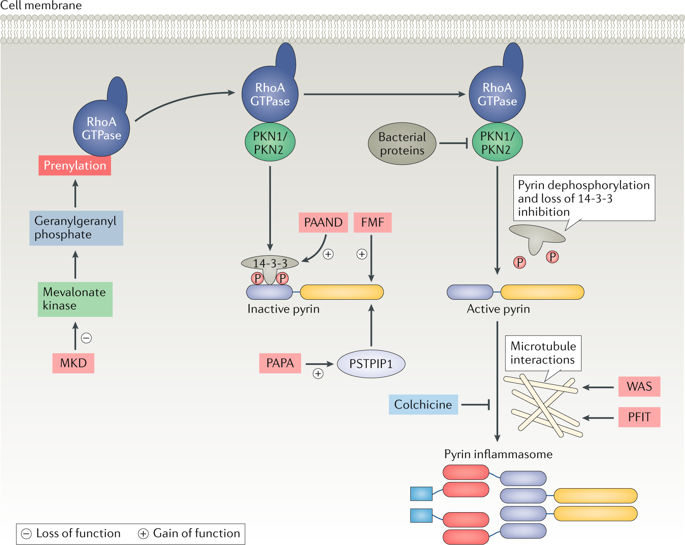当前位置:
X-MOL 学术
›
Nat. Rev. Rheumatol.
›
论文详情
Our official English website, www.x-mol.net, welcomes your feedback! (Note: you will need to create a separate account there.)
Moving towards a systems-based classification of innate immune-mediated diseases.
Nature Reviews Rheumatology ( IF 33.7 ) Pub Date : 2020-02-27 , DOI: 10.1038/s41584-020-0377-5 Sinisa Savic 1, 2, 3 , Emily A Caseley 1 , Michael F McDermott 1
Nature Reviews Rheumatology ( IF 33.7 ) Pub Date : 2020-02-27 , DOI: 10.1038/s41584-020-0377-5 Sinisa Savic 1, 2, 3 , Emily A Caseley 1 , Michael F McDermott 1
Affiliation

|
Autoinflammation as a distinct disease category was first reported in 1999 as a group of monogenic disorders characterized by recurrent episodes of systemic and organ-specific inflammation, known as periodic fever syndromes. Since this original description, the focus has shifted considerably to the inclusion of complex multifactorial conditions with an autoinflammatory basis. Furthermore, the boundaries of what are considered to be autoinflammatory disorders are constantly evolving and currently encompass elements of immunodeficiency and autoimmunity. Notable developments in the intervening 20 years include substantial progress in understanding how the different inflammasomes are activated, how infection is sensed by the innate immune system and how intracellular signalling systems are consequently activated and integrated with many different cellular functions in the autoinflammatory process. With these developments, the field of autoinflammation is moving from a gene-centric view of innate immune-mediated disease towards a systems-based concept, which describes how various convergent pathways, including pyrin and the actin cytoskeleton, protein misfolding and cellular stress, NF-κB dysregulation and interferon activation, contribute to the autoinflammatory process. The development and adoption of a systems-based concept of systemic autoinflammatory diseases is anticipated to have implications for the development of treatments that target specific components of the innate immune system.
中文翻译:

迈向基于系统的先天免疫介导疾病分类。
自发性炎症是一种独特的疾病类别,于1999年首次报道为一组以基因性和器官特异性炎症反复发作为特征的单基因疾病,称为周期性发热综合征。自从最初的描述以来,重点已转移到包含具有自体炎症基础的复杂多因素疾病。此外,被认为是自身炎症性疾病的界限在不断发展,并且目前包括免疫缺陷和自身免疫的要素。在过去的20年中,显着的发展包括在了解不同的炎症小体如何被激活,先天免疫系统如何感测感染,以及细胞内信号传导系统如何因此被激活并与自身炎症过程中的许多不同细胞功能整合。随着这些发展,自发性炎症领域正从以基因为中心的先天性免疫介导疾病转变为基于系统的概念,该概念描述了各种收敛途径,包括吡啶和肌动蛋白的细胞骨架,蛋白质错折叠和细胞应激,NF -κB失调和干扰素激活,有助于自身炎症过程。预期以系统为基础的系统性自身炎性疾病的概念的发展和采用将对靶向先天免疫系统特定成分的治疗方法产生影响。随着这些发展,自发性炎症领域正从以基因为中心的先天性免疫介导疾病转变为基于系统的概念,该概念描述了各种收敛途径,包括吡啶和肌动蛋白的细胞骨架,蛋白质错折叠和细胞应激,NF -κB失调和干扰素激活,有助于自身炎症过程。预期以系统为基础的系统性自身炎性疾病的概念的发展和采用将对靶向先天免疫系统特定成分的治疗方法产生影响。随着这些发展,自发性炎症领域正从以基因为中心的先天性免疫介导疾病转变为基于系统的概念,该概念描述了各种收敛途径,包括吡啶和肌动蛋白的细胞骨架,蛋白质错折叠和细胞应激,NF -κB失调和干扰素激活,有助于自身炎症过程。预期以系统为基础的系统性自身炎性疾病的概念的发展和采用将对靶向先天免疫系统特定成分的治疗方法产生影响。蛋白质错误折叠和细胞应激,NF-κB失调和干扰素激活,都有助于自身炎症过程。预期以系统为基础的系统性自身炎性疾病的概念的发展和采用将对靶向先天免疫系统特定成分的治疗方法产生影响。蛋白质错误折叠和细胞应激,NF-κB失调和干扰素激活,都有助于自身炎症过程。预期以系统为基础的系统性自身炎性疾病的概念的发展和采用将对靶向先天免疫系统特定成分的治疗方法产生影响。
更新日期:2020-02-27
中文翻译:

迈向基于系统的先天免疫介导疾病分类。
自发性炎症是一种独特的疾病类别,于1999年首次报道为一组以基因性和器官特异性炎症反复发作为特征的单基因疾病,称为周期性发热综合征。自从最初的描述以来,重点已转移到包含具有自体炎症基础的复杂多因素疾病。此外,被认为是自身炎症性疾病的界限在不断发展,并且目前包括免疫缺陷和自身免疫的要素。在过去的20年中,显着的发展包括在了解不同的炎症小体如何被激活,先天免疫系统如何感测感染,以及细胞内信号传导系统如何因此被激活并与自身炎症过程中的许多不同细胞功能整合。随着这些发展,自发性炎症领域正从以基因为中心的先天性免疫介导疾病转变为基于系统的概念,该概念描述了各种收敛途径,包括吡啶和肌动蛋白的细胞骨架,蛋白质错折叠和细胞应激,NF -κB失调和干扰素激活,有助于自身炎症过程。预期以系统为基础的系统性自身炎性疾病的概念的发展和采用将对靶向先天免疫系统特定成分的治疗方法产生影响。随着这些发展,自发性炎症领域正从以基因为中心的先天性免疫介导疾病转变为基于系统的概念,该概念描述了各种收敛途径,包括吡啶和肌动蛋白的细胞骨架,蛋白质错折叠和细胞应激,NF -κB失调和干扰素激活,有助于自身炎症过程。预期以系统为基础的系统性自身炎性疾病的概念的发展和采用将对靶向先天免疫系统特定成分的治疗方法产生影响。随着这些发展,自发性炎症领域正从以基因为中心的先天性免疫介导疾病转变为基于系统的概念,该概念描述了各种收敛途径,包括吡啶和肌动蛋白的细胞骨架,蛋白质错折叠和细胞应激,NF -κB失调和干扰素激活,有助于自身炎症过程。预期以系统为基础的系统性自身炎性疾病的概念的发展和采用将对靶向先天免疫系统特定成分的治疗方法产生影响。蛋白质错误折叠和细胞应激,NF-κB失调和干扰素激活,都有助于自身炎症过程。预期以系统为基础的系统性自身炎性疾病的概念的发展和采用将对靶向先天免疫系统特定成分的治疗方法产生影响。蛋白质错误折叠和细胞应激,NF-κB失调和干扰素激活,都有助于自身炎症过程。预期以系统为基础的系统性自身炎性疾病的概念的发展和采用将对靶向先天免疫系统特定成分的治疗方法产生影响。



























 京公网安备 11010802027423号
京公网安备 11010802027423号